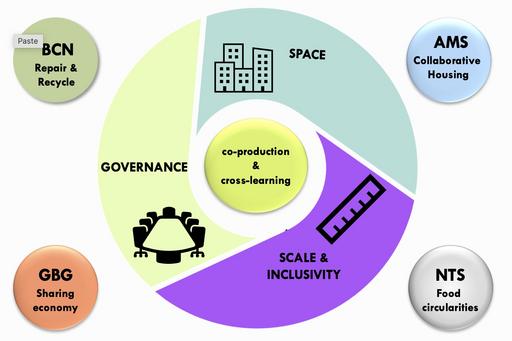Circular grassroots innovations for sustainable and inclusive urban transitions
Short description
The project aims at examining the challenges and opportunities that urban circular grassroots innovations encounter to create, maintain and scale their solutions for sustainable and inclusive transitions from below. Researchers from six universities in the cities of Amsterdam, Barcelona, Nantes and Gothenburg participates together with grassroots organisations and initiatives from the cities. See consortium information below.
Circular Grassroots Webinar Series
The spring 2026, the Circular Grassroots project convenes a series of four webinars (all details here) focusing on metabolic contributions, environmental conflicts and contestation, value creation beyond monetary valuation, and space governance regimes associated with grassroots initiatives for just post-growth cities.
The webinar series brings together insights from the Circular Grassroots research project, funded by the Driving Urban Transitions (DUT) programme, alongside perspectives from grassroots activists, municipal officers, politicians, and leading researchers in the field. Contributions draw on experiences from four European frontrunner cities, Amsterdam, Barcelona, Nantes, and Gothenburg, while also engaging a broader range of voices and expertise.
Participation in the webinars is open to researchers, grassroots practitioners, and municipal decision-makers with an interest in circular urban economies, post-growth transitions, and innovative governance arrangements.
- Book Launch Event, 28 January, “Contested Waste: Environmental Conflicts and Waste Picker Resistance in the Global South” 14:00
- Grassroots Metabolism, Feburary 2, 15.00-16.30
- What Gets Valued? Circular Grassroots Beyond Monetary Value, March 2, 15:30-17
- Grassroots Initiatives and Space Governance, March 23, 12.00-13.30
Background
The project aims at examining the challenges and opportunities that urban circular grassroots innovations encounter to create, maintain and scale their solutions for sustainable and inclusive transitions from below. Cities are spaces of overconsumption, waste-intensive production, and high environmental footprints, but also hubs for creativity and innovation. Citizens experiment with a wealth of innovations to address the challenge of a steady consumption growth and overuse of resources. Despite their contributions further research is necessary to investigate the challenges and opportunities to diffuse these practices in terms of:
a) space (in central/periurban city districts),
b) collaborative and democratic arenas among local government, urban planners and grassroots organizations,
c) inclusivity and scalability of the grassroots initiatives (challenges to meet their ambitions, grow, replicate and expand their sharing/circularity practices).

The project adopts an inter/transdisciplinary and participatory action-research approach in Amsterdam, Barcelona, Gothenburg and Nantes, building on our previous research from several disciplines (sociology, human geography, urban planning, social psychology, consumption, business and public administration) and areas (repairing, housing, food, recycling). The project supports the scaling of the innovations by facilitating knowledge co-production among activists, social enterprises, scholars and policymakers.




